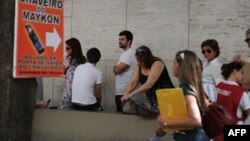The Biden administration has reduced wait times worldwide for nonimmigrant visa interviews, an official said Thursday.
During a briefing with reporters, Julie Stufft, deputy assistant secretary for visa services at the State Department’s Bureau of Consular Affairs, said that the agency had doubled its hiring of U.S. foreign service personnel who process visa applications, and that the processing was rebounding faster than projected.
“Our embassies and consulates are again open for routine consular services, including visitor visa interviews," Stufft said. "We've seen a tremendous drop in wait times today. We have a median global wait time of seven weeks for visitor visa interviews and only seven days for students and temporary workers. That's down significantly from just a few months ago.”
Nonimmigrant visas are issued to foreign nationals seeking to enter the United States temporarily for business, medical treatment, tourism or temporary work.
Stufft told reporters that local pandemic-era restrictions had curbed the agency’s ability to see visa applicants, because in most cases, the applicant is required by U.S. law to appear in person.
The applications that built up over the past two years have combined with regular seasonal demand, resulting in extended wait times for U.S. visa interview appointments, Stufft said.
“This fiscal year [2023] we anticipate getting back to pre-pandemic processing numbers. And with that, we will focus on decreasing the tremendously pent-up demand of a few locations,” she said.
According to the State Department, most countries have lifted restrictions, and 96% of U.S. embassies and consulates can provide routine visa services.
Progress disputed
But David Bier, associate director of immigration policy at the libertarian Cato Institute, who follows the issue closely, disagreed.
“They haven’t returned to pre-pandemic, nonimmigrant visa processing,” Bier said, nearly two years into the Biden administration. During those two years, the administration waived interviews for many nonimmigrants to renew their visas, he wrote in an email to VOA.
In August, visitors to the United States, whether for business, education or leisure travel, were facing significant wait times for visas. Some international travelers were waiting six months to a year to schedule a visa interview, according to State Department data.
As of Thursday, a tourist in Rio de Janeiro, Brazil, could expect to wait 420 days for an interview, while students and temporary workers faced three-day interview wait times. Meanwhile, in Bogota, Colombia, visitors were waiting about 799 days for interviews, while students and people applying for temporary work visas were waiting about 13 days for interviews.
In July, a tourist in Rio de Janeiro had to wait 500 days for an interview, while in Bogota, the wait was about 846 days.
The U.S. allows citizens of 40 countries to travel to the U.S. for business or tourism for stays of up to 90 days without visas. Citizens of all other countries must apply for visas.
In general, the applicant begins by completing an online form on the State Department’s website, paying a visa fee and scheduling an interview.
Stufft said that the agency was continuing to add consular staff abroad and that the newly trained employees were now headed overseas.
In coordination with the U.S. Department of Homeland Security, the State Department has expanded the use of interview waivers, meaning officials forgo interviews for low-risk visitors who are renewing their visas, while still safeguarding national security.
"That allowed us to waive the in-person requirement for many students, temporary workers, applicants who are applying for renewal visas and other low-risk travelers,” she said.
In his October report, Bier wrote that “given the decentralization of interviews, interview wait times vary dramatically around the world.”




